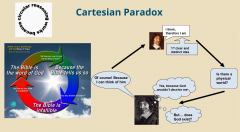- Barajar
ActivarDesactivar
- Alphabetizar
ActivarDesactivar
- Frente Primero
ActivarDesactivar
- Ambos lados
ActivarDesactivar
- Leer
ActivarDesactivar
Leyendo...
Cómo estudiar sus tarjetas
Teclas de Derecha/Izquierda: Navegar entre tarjetas.tecla derechatecla izquierda
Teclas Arriba/Abajo: Colvea la carta entre frente y dorso.tecla abajotecla arriba
Tecla H: Muestra pista (3er lado).tecla h
Tecla N: Lea el texto en voz.tecla n
![]()
Boton play
![]()
Boton play
![]()
4 Cartas en este set
- Frente
- Atrás
|
Rationalism
|
Knowledge acquired through reason.
Even though the matter world is real, when it's perceived in a chaotic way, it's our reason what gives it a meaning through interpretation. This is achieved through the perception of a substance, an essence that remains within the objects. |
|
Rene Descartes
|

He brought up the mind-body problem.
His system is known as methodic doubt or Cartesian doubt. In order to reach absolute certainties you have to start from an absolute doubt. There are 2 types of substances: reason and matter. The "I think, therefore I am (cogito ergo sum)" proves the existence of the first one, but how can we prove the existence of the second one? GOD, obviously. If God exists, all my clear and distinct ideas will be true. |
|
Baruch Spinoza
|
There's just one substance: GOD. It has two attributes: thought and extension. All things in the world are modifications of this only substance.
This doctrine is known as pantheism. Every idea implies an objective reality. for idea and matter are attributes of the same reality. There are no true nor false ideas, but adequate or inadequate. 3 levels of knowledge: •Opinion: Imagination: empiric and leads to confusion. •Rational: adequate ideas common to all human kind. •Intuitive: holistic knowledge of God. |
|
Gottfried Wilhelm Leibniz
|
Physical reality can't be based in something extensive (the extensive can't be made of unextensive points.
Extension is an illusion and is made of simple, all-containing and no material beings, called monads. Like atoms without matter. GOD as the infinite monad. Types of monads: • Just perceiving Monads; common matter • The Memory Monads, like in the non-rational animals. • The Reason Monads, like our understanding (soul) or God. Man is a reason monads (soul) and perceiving monads (body) combo. Monads of reason perceive with more clarity than the others, that's where knowledge is born. We have innate ideas (identity, cause and perception) as dispositions. Since each monad contains everything, we virtually know everything. |